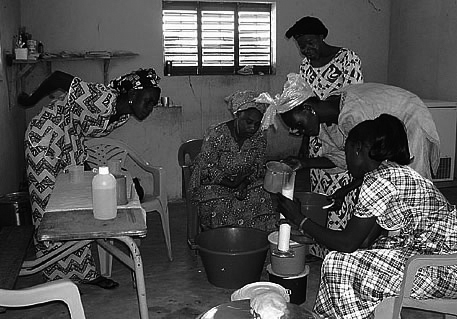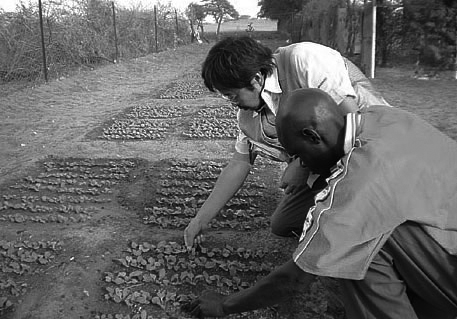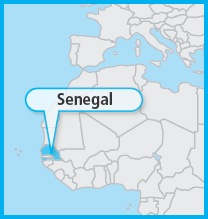Japan's Official Development Assistance White Paper 2009
Column 7 Stable Supply of Agricultural Products
— Project for Self-sustained Development in a Rural Village in Senegal —
Senegal is a country in West Africa whose major industries are agriculture and fishing. Because it gets little annual rainfall, however, in order to secure water which is important for agriculture, Japan has built water supply facilities in agricultural villages, and in 2003, it carried out cooperation regarding methods to operate and maintain the facilities. Since 2008, Japan has been carrying out projects to support self-sustained development by such rural villages
Moukhmoukh Village is one of the sites for this agricultural support project, and various efforts are being carried out to boost the productivity of agriculture. The village has been divided into a number of groups centering on a water supply facility, and each group produces vegetables and raises livestock. This project, which is aiming for the continuous self-sustained development of agriculture, is being handled by JICA consultants Mr. Inoue, Mr. Goto, and Mr. Nishiyama. These consultants provide assistance based on their specialized backgrounds in order to achieve sustainable agricultural living at the village, but sometimes they have difficulty getting the local people to understand what they want to communicate. For example, at markets in Senegal, solanaceous crops such as eggplants and tomatoes are popular, so they are grown over and over again in the same fields. This, however, makes the fields susceptible to diseases, and in order to avoid this problem, it is necessary to sometimes plant different crops. Nevertheless, it has been difficult to explain and get the people of the village to understand the importance of the sustainable use of fields when they have to choose between the sustainable use of fields and making a living.
As can be seen in this example, Moukhmoukh Village still has issues that it needs to overcome in order to achieve self-sustained development, but there are also things which are already going well. In this region, the production of yoghurt is one of the important sources of income. Yoghurt is commonly eaten in Senegal, and if it is sold at any time, it can become a steady income. Thus, methods of sterilizing yoghurt were taught in order to produce good yoghurt. The yoghurt made in this way has been well-received. It is sold at the offices of the water management association which manages the water supply facility, and it is sold out almost every day. The amount of milk decreases during the rainy season, and in order to meet the continuing demand from customers, the yoghurt is produced from powdered milk.
In order to systematically produce products and supply them in a stable manner, records and management are needed. Advice has been given so that records of the collection of materials, sales, management of goods, and so forth are kept in management booklets. Expert Mr. Nishiyama, who carried out this instruction, speaks of the start of forward-looking efforts by the people of the village regarding products and management, saying, "Things are clearly written as numbers, so they all get a sense of achievement and carry out their work with enthusiasm."
This project has also led to unexpected effects other than improvements in agricultural productivity.
Women have come to work more energetically as a result of their going out and communicating with other women. One woman says happily, "We help each other and teach each other things. We do not worry even when we get sick. I am happy that there are many people we can have exchanges with. Now the region as a whole has become more cooperative, and it is easier to live here."
Mr. Inoue speaks of aspirations for the future regarding this project, which aims for independent development at the village, saying, "Going forward, we would like to put in place a system so that the local residents can do everything themselves, from planning to implementation and self-evaluation."

Mr. Nishiyama giving instruction on silage training. (Photo: Mr. Nishiyama)

Mr. Goto giving instruction on thinning out vegetable seedlings. (Photo: Mr. Goto)

